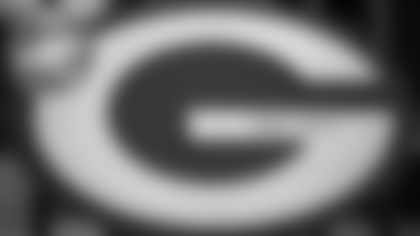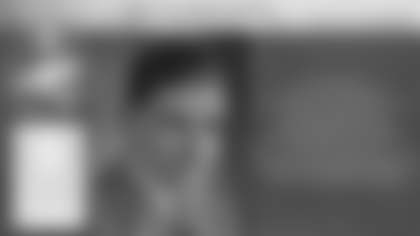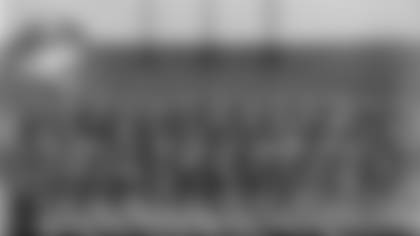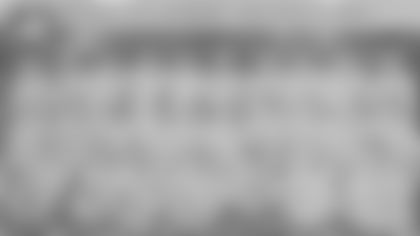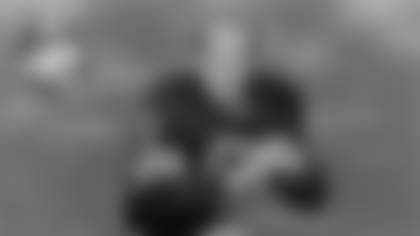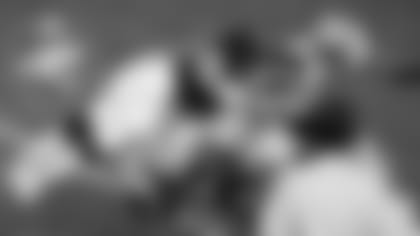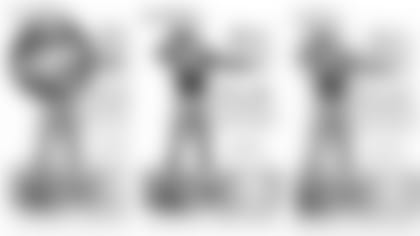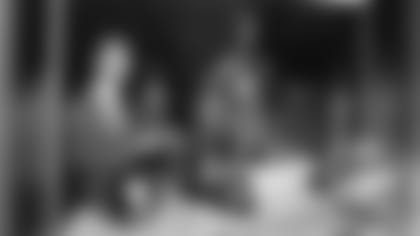Tony from Detroit, MI
My uncle told me about the fans running on the field after the last game of the season at Lambeau. In fact, one of his buddies tried to steal the hat of a police officer and was, well, let's call it, "dealt with." When did this tradition begin and when did it end?
From what I remember, the tradition was about more than just running on the field and it wasn't a planned or annual occurrence. The celebrations were almost always spontaneous and prompted by title-clinching victories; and usually the fans not only stormed the field, but also tore down the goal posts. The most memorable of those celebrations occurred after the Packers won NFL championship games in Green Bay in 1961 at what was then Green Bay City Stadium, and again in 1965 and '67 after it had been renamed Lambeau Field.
Keep in mind the Packers had played only two regular-season December games at Lambeau before the Ice Bowl. The first was on Dec. 5, 1965, against Minnesota and it was 40 degrees. The second was against Pittsburgh just two weeks before the Ice Bowl.
In fact, through the 1960s, the Packers almost always played their final regular-season home game in Green Bay before Thanksgiving. Thus, there were no title-clinching games to celebrate here through the Lombardi era, other than the 1965 playoff victory over the Baltimore Colts.
The Packers clinched three of their six Western Conference titles under Lombardi at Milwaukee County Stadium, and fans there tore down the goal posts after at least two of them: On Dec. 3, 1961, and Dec. 23, 1967.
Once Lombardi left, there really wasn't anything for Packers fans to celebrate for roughly a quarter-century, although Tom Pigeon, one of our tour guides at Lambeau, remembered that the goal posts were torn down after the Packers beat Detroit, 10-9, on Dec. 4, 1977. The fans were giddy over the Packers snapping a five-game losing streak against a sub-.500 Detroit team. They also carried defensive tackle Dave Roller off the field on their shoulders that day.
The last time fans tore down the goal posts at Lambeau after a playoff win was when the Packers beat the St. Louis Cardinals in the 1982 Super Bowl Tournament.
Estimates were that 5,000 to 7,000 fans rushed the field after that game and it cost the city $7,000 to replace two goal posts. Thus, the following August, the Green Bay City Council passed an ordinance setting fines for anybody going on the field after the game.
And that was when the tradition died, although I believe it basically had been in mothballs since Lombardi left.
You mentioned that one of your uncle's buddies tried to steal a hat once during a postgame, on-field celebration. I don't think that was unusual. I can still picture fans swarming and jostling Lombardi as he tried to make his way off the field after more than one of those celebrations.
In fact, Bill Berry, a fellow Green Bay East grad and former athlete there, recently sent me an email about one such incident.
"One memory stands out from the Baltimore game," he wrote. "After the Packers won (the disputed field goal, right?), Danny (Maloney) and I hopped the fence and went down on the field. That was a regular occurrence in those days. We found ourselves maybe 30 feet from Vince, when someone snatched his fedora and ran off. We were startled when Lombardi yelled 'Hey!' Fuzzy Thurston was near Vince, and when he heard the shout, he took off after the guy, grabbed him by the collar and ripped the hat out of his hand. He walked back and handed it to Vince. I don't remember if the coach said thanks."
Two years later, someone snatched Lombardi's hat following the Ice Bowl and he got that one back, too. That time, he chased the kid down, collared him and took his own hat back.
Actually, here's another long forgotten Ice Bowl story. When Bart Starr scored on his quarterback sneak with 13 seconds to go, fans started to stream onto the field – maybe as many as 100 or more – and police and civil defense workers had to clear them off before the game could be completed.
Joe from Eau Claire, WI
I have a question regarding an answer you gave last February to someone who asked if anyone had died during a game at Lambeau Field. The last part of your answer stated that to your knowledge no one died during the Ice Bowl. I seem to remember an NFL Films release where Lee Remmel said an elderly man died of exposure during the game.
I'm reluctant to question anything Lee said, especially when it's next to impossible to prove otherwise. All I know is I couldn't find any mention about someone dying either at the stadium or following the game in the Green Bay Press-Gazette's coverage on Jan. 2, 1968. The paper didn't put out an edition the day after the game because it was New Year's so Tuesday's paper carried all the game coverage, as well as sidebars about the weather and fans.
The Press-Gazette noted there were 16 cases of frostbite treated at St. Mary's Hospital on the day of the game and three at Bellin Hospital the day after the game. It also noted there were several ambulance and rescue calls during the game, but said nothing about anyone dying. I also checked the Jan. 3 paper and couldn't find a story there, either. What's more, none of the obituaries in the Press-Gazette's Jan. 2 and 3 editions mentioned anything about someone dying while attending or watching the game.
Perhaps Lee was told by a family member that someone had been hospitalized the day of the game and died later of exposure or some other cause, but I'm not aware of the Ice Bowl causing anyone's death.
Tom from Pine River, WI
I had an opportunity to listen to the actual radio broadcast of the last four minutes of the Ice Bowl. I was surprised to learn Starr called the final timeout with 16 seconds remaining, but stayed on the field. Then he called the sneak. It makes me question Lombardi's quote, "Let's run it and get the hell out of here." Wouldn't it make more sense that Jerry Kramer would have said something like that and was right when he said Starr told him he was keeping the ball?
Starr called his first timeout with 54 seconds remaining following Chuck Mercein's 8-yard gain to the 3. On second-and-2, Anderson picked up a first down. Then he failed to score from the 1 on back-to-back plays.
After the first carry from the 1, when Anderson fell into the end zone and believed he had scored, Starr called his second timeout. Twenty seconds remained, and both Starr and tackle Forrest Gregg huddled with Lombardi on the sideline. On the next play, Anderson slipped and fell short of the goal line. That's when Starr called his third and final timeout with 16 seconds remaining.
He also ran to the sideline and talked briefly with Lombardi, while Paul Hornung, retired and in street clothes, stood nearby.
Lombardi had invited Hornung to watch the game from the sideline. Actually, Lombardi all but ordered Hornung to be there. "Lombardi called me before the game and said, 'I want you there,'" Hornung wrote in his book, "Golden Boy." Then, just before half, Hornung said Lombardi summoned him from the bench and invited him to offer suggestions about plays that might work.
As for your doubts about the sequence of events in the final minute of play, Starr's confab with Lombardi with 16 seconds remaining can still be viewed on highlight films of the game. Perhaps because the conversation between the two didn't last that long, the radio announcer didn't mention it.
As for your doubts about Lombardi giving his blessing to Starr to run the sneak so they could get "the hell out of there," they were the only two who were part of the conversation from the clips I've seen. And Starr is the one who told me and countless others the story. I have no doubt he was telling the truth.
Rob from Eden Prairie, MN
I was reading "Instant Replay" and Jerry Kramer said on the morning of the Ice Bowl a helicopter was flying low over the stadium, clearing snow off the benches. Who would have authorized that and was it standard practice?
I asked Chuck Lane, who was the Packers' director of public relations at the time and the person who broke the news to Lombardi about his electric blanket, whether he remembered seeing a helicopter. Lane was one of the first, if not the first, Packers officials to arrive at the stadium that day and he responded to my inquiry by email.
"I got there plenty early that morning (Lombardi time, and then some) and I do not recall there being any helicopter involved," Lane wrote. "It was so cold, it did not snow so that was not the issue. The field was covered and the heat turned on, and the condensation under the tarp was the culprit… I'm pretty sure I'd have heard or seen a helicopter if it had been out there."
Marin from West Lawn, PA
I've been reading Rob Reischel's book, "Leaders of the Pack." In the chapter on Bart Starr the author wrote there were some who believed Vince Lombardi had cut the power to the new $80,000 system to heat the field before the start of the Ice Bowl. The whole idea goes beyond preposterous. I've read Lombardi was extremely proud of the system. Have you ever heard of anyone suggesting such a thing?
I can't tell you nobody ever suggested that, but my intuition tells me writers are generally better off when they avoid lending credence to the absurd.
The electrical system worked the day of the Ice Bowl, so the problems with the field didn't stem from the power being cut off. Again, Lane was there and involved in the game-day talks that centered on the electric blanket.
Here's his explanation of what happened: "Moisture condensed between the tarp and the turf, and when the tarp was removed the top layer of soil began to flash freeze." Then, because it was so cold and so much moisture had built up, the electrical system –even at its maximum setting – couldn't keep up to the field's deteriorating conditions.
Dave Robinson was among those who have verified that for me. "It worked," he told me when I asked him about the blanket in 2014. "It was a wet, muddy field. But with 13-below zero and the wind blowing, how long does it take for something to freeze? The wind was blowing across that wet grass and it froze. But it didn't freeze until the third quarter."
Lane added: "I have no idea where these folks come up with these theories, but this one has to be the most ridiculous I have ever heard."
As you noted, Lombardi was more than proud of his technological toy, the electric blanket under the field that had been installed that year. In fact, the day before the game he stood before a gathering of visiting sportswriters in a small control room off the north tunnel of Lambeau and proud as a peacock impersonated a mad scientist as he explained how the blanket worked. He also guaranteed them there would be no problems with the field the next day.
Those who knew Lombardi well will attest to the fact he hated to lose. They also will tell you, he hated to be wrong, almost as much.
Willie from Hayward, WI
I'm aware of Red Cochran being a scout for the Packers in his post-coaching days, but why did he leave the coaching staff after the 1966 season?
Cochran was the first assistant hired by Lombardi and remained on his staff through Super Bowl I. I've been told by several players and club officials that it wasn't unusual for Lombardi to occasionally direct his fits of rage at Cochran and perhaps for no other reason than to keep everyone else on edge.
I got to know Cochran well when he returned to the Packers in the 1970s and over his many years as a scout and always enjoyed talking to him. He was opinionated and brutally honest. He also had a thick skin. Maybe that's why Lombardi knew he could rail at him and Cochran wouldn't take it personally.
I asked Red once why he quit Lombardi's staff to go into business. He told me he had lost his enthusiasm, but that he never had problems with how Lombardi treated him on the job.
"I had one flare-up with him in my whole time here," Cochran told me in 2002. "Hornung screwed up on a play and Vince jumped on me, 'Red, how come you don't go over this stuff?' I knew I had gone over it, but I just backed away. When we came up to the dressing room, I said, 'Coach, don't ever jump me again like that on the field. You (darn) well know I went over that and Hornung just screwed it up.' He didn't say a word. He just got up and walked out of the room."
However, fellow assistant coach Bob Schnelker, who was certainly closer to Red than I was, told me it was an off-the-field incident that led to Cochran's resignation.
"We were coming back, I think from the first Super Bowl," Schnelker told me in 2009. "We could bring the wives back with us. In those days, there were quite a few first-class seats and the coaches and wives sat there. But there wasn't enough room for all of us. Vince had Red and (his wife) Pat sit in the back.
"Red blew up: 'Why should it be me? I've been here longer than a lot of these guys.' Red was pretty hotheaded and he got into a shouting match with Vince. Pat and Red were the only two who had to go in the back."
Cochran died in 2004 after spending 42 years with the Packers as an assistant coach and scout, one of the longest tenures anyone has spent in the Packers' football operation.




